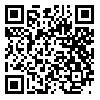Volume 15, Issue 5 (Sep & Oct 2025)
J Research Health 2025, 15(5): 447-458 |
Back to browse issues page
Ethics code: 68
Download citation:
BibTeX | RIS | EndNote | Medlars | ProCite | Reference Manager | RefWorks
Send citation to:



BibTeX | RIS | EndNote | Medlars | ProCite | Reference Manager | RefWorks
Send citation to:
S S, Kumar R, Srivastava A, Tamarana R. Religious Coping in Stress Management: A Systematic Review. J Research Health 2025; 15 (5) :447-458
URL: http://jrh.gmu.ac.ir/article-1-2724-en.html
URL: http://jrh.gmu.ac.ir/article-1-2724-en.html
1- Department of Psychology, School of Social and Behavioral Sciences Central University of Karnataka, Kalaburagi, India.
2- Department of Psychology, School of Social and Behavioral Sciences Central University of Karnataka, Kalaburagi, India. ,ravinderkumar@cuk.ac.in
2- Department of Psychology, School of Social and Behavioral Sciences Central University of Karnataka, Kalaburagi, India. ,
Abstract: (517 Views)
Background: Stress is a common experience in daily life, and individuals often rely on various coping strategies to manage its effects. Religious coping, which involves using religious beliefs and practices to navigate stressful situations, has been increasingly recognized for its potential impact on stress reduction and psychological well-being. This paper explored the effectiveness of religious coping in managing stress, with a focus on how different types of religious coping—positive and negative—affect stress levels and overall well-being.
Methods: A systematic review was conducted using PRISMA (2020) guidelines. Data were extracted from databases, such as Google Scholar and ScienceDirect, through Zotero software using a combination of keywords, like ‘religious coping,’ ‘stress,’ ‘positive coping,’ and ‘negative coping.’ Out of 228 articles, 12 articles met the inclusion criteria for final analysis.
Results: The review identified religious coping as a significant outcome for stress reduction. Positive religious coping was linked to lower perceived stress, enhanced psychological well-being, and stress-related growth, as it helped individuals reframe stress as an opportunity for personal development. However, negative religious coping was associated with higher perceived stress, reduced well-being, and increased risks of mental health issues, including depression and anxiety. Variations in coping efficacy were influenced by gender, religious commitment, and individual contexts.
Conclusion: Positive religious coping emerges as a valuable tool for fostering resilience and psychological growth. While negative religious coping is associated with less favourable outcomes, it may serve as a temporary source of comfort. Therefore, interventions should not outright discourage its use but instead aim to promote awareness and gradual adoption of more adaptive coping strategies in a culturally sensitive manner.
Methods: A systematic review was conducted using PRISMA (2020) guidelines. Data were extracted from databases, such as Google Scholar and ScienceDirect, through Zotero software using a combination of keywords, like ‘religious coping,’ ‘stress,’ ‘positive coping,’ and ‘negative coping.’ Out of 228 articles, 12 articles met the inclusion criteria for final analysis.
Results: The review identified religious coping as a significant outcome for stress reduction. Positive religious coping was linked to lower perceived stress, enhanced psychological well-being, and stress-related growth, as it helped individuals reframe stress as an opportunity for personal development. However, negative religious coping was associated with higher perceived stress, reduced well-being, and increased risks of mental health issues, including depression and anxiety. Variations in coping efficacy were influenced by gender, religious commitment, and individual contexts.
Conclusion: Positive religious coping emerges as a valuable tool for fostering resilience and psychological growth. While negative religious coping is associated with less favourable outcomes, it may serve as a temporary source of comfort. Therefore, interventions should not outright discourage its use but instead aim to promote awareness and gradual adoption of more adaptive coping strategies in a culturally sensitive manner.
Type of Study: Review Article |
Subject:
● Psychosocial Health
Received: 2025/01/15 | Accepted: 2025/04/5 | Published: 2025/08/5
Received: 2025/01/15 | Accepted: 2025/04/5 | Published: 2025/08/5
| Rights and permissions | |
 |
This work is licensed under a Creative Commons Attribution-NonCommercial 4.0 International License. |





